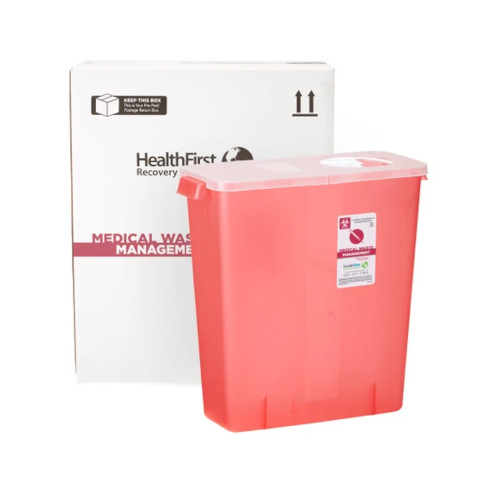Liable Solutions: Comprehending Medical Waste Disposal Services
In the world of health care, the appropriate disposal of clinical waste is a crucial element that requires mindful consideration. The importance of managing clinical waste properly exceeds simple conformity with regulations; it straight impacts public wellness and environmental safety and security. As healthcare centers generate different kinds of waste that require customized handling, comprehending the subtleties of medical garbage disposal solutions is critical. By discovering the intricacies of this crucial process, we can clarify the best methods, advantages of professional solutions, and sustainable remedies available.
Relevance of Correct Clinical Garbage Disposal
Proper medical waste disposal is essential in maintaining a hygienic and secure atmosphere within health care facilities. In medical care settings, various types of waste are created daily, consisting of transmittable products, sharps, ran out medicines, and chemical materials.

Kinds Of Clinical Waste
Within health care facilities, a diverse array of waste products categorized as medical waste is generated, each calling for certain handling and disposal methods. Pathological waste, which consists of tissues, organs, and body components, demands appropriate disposal to appreciate the dignity of the dead and protect against any kind of biohazards. Recognizing the different types of medical waste is essential for medical care centers to execute efficient waste administration strategies and safeguard public health and wellness and the setting.
Laws and Compliance
Medical care facilities must abide by stringent policies relating to the handling and disposal of clinical waste to make sure conformity with lawful needs and guard public health and wellness. These policies are placed in location to avoid the spread of infections, protect the setting, and preserve the safety of healthcare workers and the public. Different regulatory bodies, such as the Epa (EPA), the Occupational Security and Wellness Management (OSHA), and the Department of Transportation (DOT), have details guidelines that health care facilities have to follow.
To conform with these laws, health care centers have to effectively set apart, shop, transportation, and take care of different kinds of medical waste. This consists of sharps waste, infectious waste, contaminated materials, and pharmaceutical waste, each calling for particular managing treatments. Facilities has to additionally maintain accurate records of waste generation and disposal to demonstrate conformity during assessments.
Non-compliance with clinical waste guidelines can cause extreme fines, penalties, and damage to the facility's track record. It is vital for medical care centers to stay informed regarding the latest regulations and apply robust conformity procedures to secure public health and wellness and the environment.
Advantages of Specialist Disposal Providers
Engaging professional medical waste disposal solutions provides healthcare centers a reliable and trustworthy remedy for handling dangerous products. By outsourcing this essential job to specialists, healthcare centers can make sure conformity with laws while concentrating on offering top quality like patients. Among the vital advantages of professional disposal services is the expertise they offer the table. These solutions employ experienced experts who are skilled in handling various sorts of clinical waste, ensuring appropriate partition, disposal, packaging, and transportation.
Furthermore, expert disposal solutions make use of cutting edge devices and adhere to market ideal practices to lessen ecological impact and minimize the risk of contamination. This not only promotes a more secure work setting for healthcare personnel but likewise adds to overall public health and wellness and safety and security. Additionally, contracting out medical waste disposal can bring about cost savings in the lengthy run by eliminating the demand for internal monitoring and disposal systems.
Lasting Practices in Health Care

One key sustainable technique in health care is waste reduction. By carrying out strategies to minimize unnecessary packaging, single-use items, and general waste generation, medical care facilities can dramatically check reduce the quantity of waste sent to garbage dumps or incineration. In addition, recycling programs for materials like paper, glass, go now and plastic can further minimize the environmental effect of medical care operations.

Final Thought
Finally, proper clinical garbage disposal is important in preserving a healthy and balanced and secure setting for both health care workers and the public. Recognizing the different kinds of clinical waste, following guidelines and compliance requirements, and utilizing specialist disposal services are necessary steps in responsible waste administration. By embracing sustainable techniques in health care facilities, we can minimize ecological impact and make sure the wellness of all individuals associated with the healthcare market.
As healthcare centers generate different types of waste that require customized handling, understanding the subtleties of medical waste disposal services is paramount.Within medical care facilities, a diverse array of waste products classified as medical waste is created, each needing details handling and disposal techniques. Recognizing the different kinds of medical waste is critical for health care centers to implement efficient waste monitoring strategies and secure public health and the setting.
By executing methods to reduce unneeded packaging, single-use products, and total waste generation, healthcare centers can significantly reduce the amount of waste sent out to land fills or incineration. Comprehending the various kinds of medical waste, complying with guidelines and conformity standards, and using specialist disposal services are our website essential steps in liable waste management.